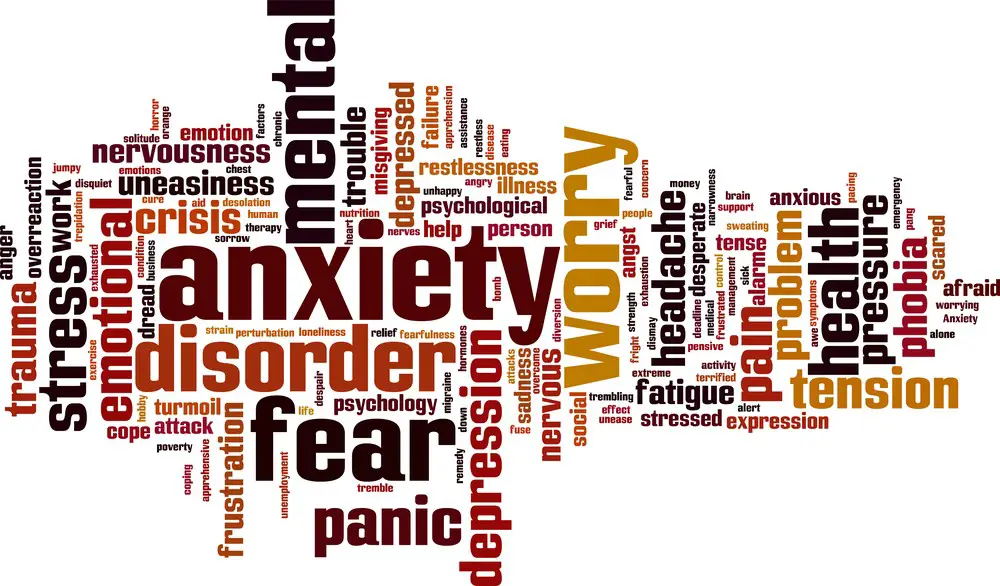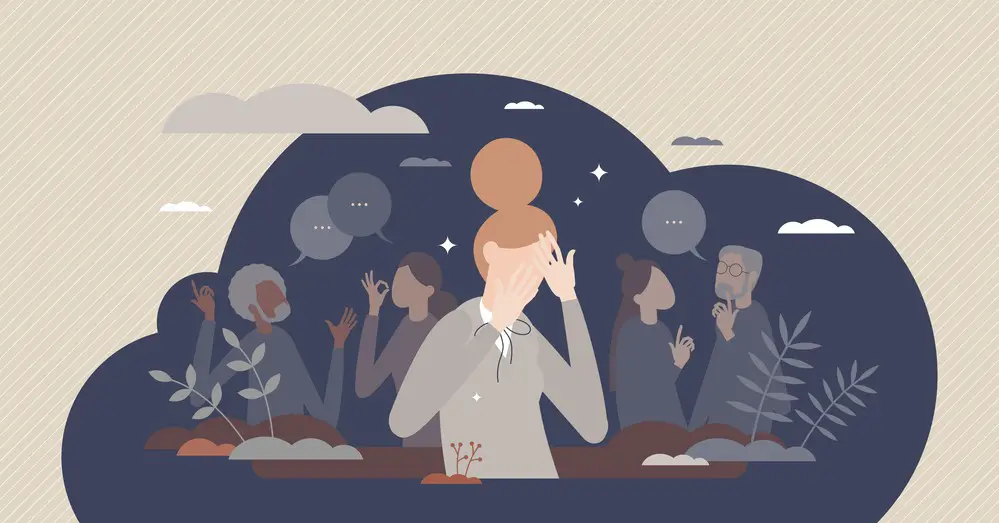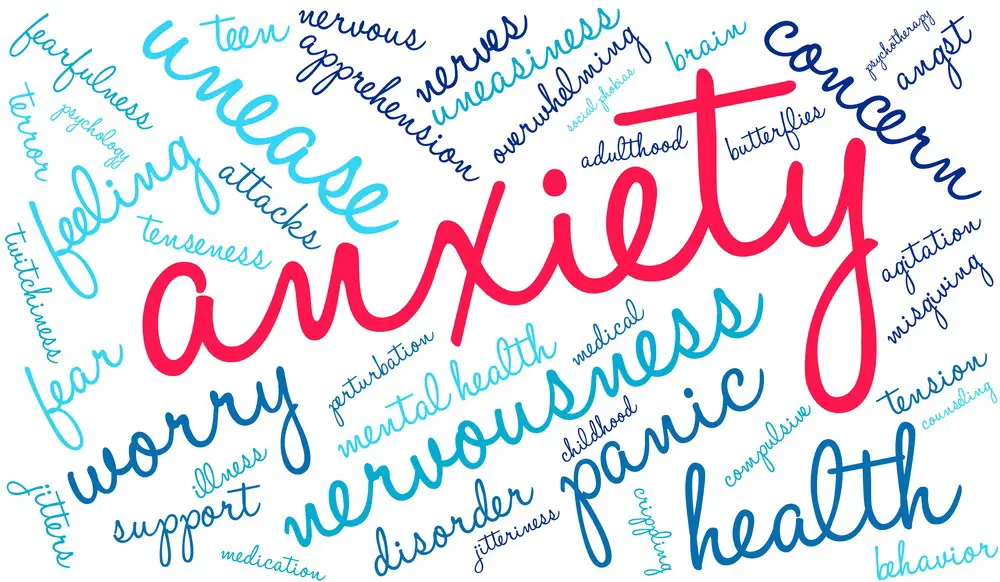As a BetterHelp affiliate, we receive compensation from BetterHelp if you purchase products or services through the links provided
Nervousness and anxiety are often confused with each other, as they share common symptoms and can be experienced simultaneously. Nervousness is a normal emotional response from anticipating an important event or situation, such as a public speech or a job interview. It tends to be temporary and situational, whereas anxiety can be more chronic, persisting in an individual’s daily life even when no specific trigger exists.
Anxiety, on the other hand, is more intense and involves persistent worry, fear, or apprehension that is excessive and irrational. It is a mental health condition that, when left unaddressed, can interfere with daily functioning and have long-term consequences. Recognizing the difference between nervousness and anxiety is essential to understand and manage these emotions effectively. There are various anxiety disorders, each with unique symptoms, causes, and treatment strategies.
Key Takeaways
- Nervousness is a normal, temporary emotion, while anxiety is an excessive, persistent mental health condition
- Different anxiety disorders exist, each with distinct symptoms, causes, and treatments
- Proper understanding of nervousness and anxiety is crucial for effective management and coping strategies.
Nervousness Vs Anxiety: Understanding the Difference

Nervousness: A Natural Response
Nervousness is a natural, temporary response to an anticipated event or situation. It often occurs when facing new experiences, challenging situations, or required performance, such as a job interview or public speaking. This reaction usually dissipates as the event passes or when a person becomes more familiar with the circumstance. Some common symptoms of nervousness include:
- Rapid heartbeat
- Sweating
- Shaking
- Shallow breathing
Nervousness is a typical stress response, helping individuals prepare for challenging tasks since it is temporary and less likely to impact daily functioning or well-being.
Anxiety: A More Complex Issue

Anxiety, on the other hand, is a more complex and long-lasting issue. It is characterized by excessive, irrational, or disproportionate worry about everyday situations. Anxiety is often persistent, even when no specific triggering event or situation exists. Symptoms of anxiety include:
- Persistent worry
- Restlessness
- Fatigue
- Difficulty concentrating
- Irritability
- Sleep disturbances
Anxiety can disrupt relationships, work, and overall quality of life. Unlike nervousness, anxiety may require interventions such as therapy, medication, or lifestyle changes to manage its effects effectively.
In summary, nervousness and anxiety stem from stressors but differ in duration, intensity, and impact on one’s life. While nervousness is a temporary reaction to a specific event, anxiety is a chronic and pervasive issue with detrimental effects on various aspects of daily functioning. Recognizing the differences between these two responses can help individuals seek appropriate support and interventions when needed.

Types of Anxiety Disorders
Generalized Anxiety Disorder (GAD)
Generalized Anxiety Disorder, or GAD, is characterized by excessive, uncontrollable worry about various aspects of life. This worry can interfere with daily activities, causing physical symptoms such as fatigue, muscle tension, and headaches.
Panic Disorder
Panic Disorder is marked by recurrent, unexpected panic attacks that can cause sudden feelings of terror, rapid heartbeat, shortness of breath, and dizziness. These attacks can occur without warning or an obvious trigger, leading to fear of future panic attacks.
Social Anxiety Disorder
Social Anxiety Disorder involves an intense fear of social situations, driven by a fear of being judged, embarrassed, or rejected. This anxiety can cause people to avoid social situations entirely or experience extreme discomfort during them.
Phobias
Phobias are intense, irrational fears of specific objects or situations. Common phobias include fear of heights, enclosed spaces, animals, or insects. These fears can cause people to alter their lives to avoid the feared objects or situations.
Post-Traumatic Stress Disorder
Post-Traumatic Stress Disorder, or PTSD, is a mental health condition triggered by a traumatic event such as a natural disaster, violent assault, or military combat. It can cause nightmares, flashbacks, and avoidance behaviors related to the traumatic event.
Separation Anxiety Disorder
Separation Anxiety Disorder is characterized by excessive fear or anxiety about being apart from loved ones or caregivers. This disorder often affects children but can also be present in adults.
Agoraphobia
Agoraphobia is an anxiety disorder characterized by an intense fear of situations where escape or help might be difficult, such as crowded spaces, public transportation, or open spaces. This fear can lead people to avoid leaving their homes and engaging in activities that trigger their anxiety.

Causes and Risk Factors
Genetics
Research suggests that a person’s genetic makeup can play a significant role in the development of anxiety. Individuals with a family history of anxiety disorders are likelier to experience anxiety. This may be due to inherited genes affecting brain chemistry and how the body responds to stress.
Trauma
Experiencing trauma in one’s life, such as accidents, violence, or abuse, can contribute to the development of anxiety. The stress caused by these events can lead to long-lasting changes in how the brain processes fear and stress, making a person more susceptible to anxiety disorders.
Personality Traits
Certain personality traits can predispose individuals to anxiety. For example, a person with a perfectionist mentality or a tendency to be overly self-critical may be more likely to develop anxiety. Additionally, those with a more introverted, shy, or cautious disposition may be at a higher risk.
Stress and Life Events
High levels of stress and significant life events can act as triggers for anxiety. This can include events such as:
- Losing a job or experiencing employment instability
- Financial difficulties
- Relationship issues
- Moving or major life transitions
These events can cause a person to feel overwhelmed and unable to cope, potentially leading to anxiety symptoms.
Risk Factors Table
| Factor | Description |
|---|---|
| Genetics | Family history and inherited genes influencing anxiety |
| Trauma | Life experiences, such as abuse or accidents |
| Personality | Traits such as perfectionism, introversion, or caution |
| Stress | High levels of stress and difficult life events |
Symptoms and Signs
Physical Symptoms
People experiencing nervousness or anxiety may manifest a variety of physical symptoms. Some common physical symptoms include:
- Headaches: Tension headaches may occur as muscles in the head and neck tense up.
- Dizziness: A sense of lightheadedness or feeling unsteady can be experienced.
- Trembling: Shaking or trembling of the hands or other body parts is common.
- Numbness: Individuals may experience numbness or tingling sensations in their limbs.
- Shortness of breath: Breathing may become shallow or rapid, leading to a feeling of suffocation.
- Nausea: Feelings of nausea, accompanied by a potential for vomiting, may be present.
- Chest tightness: Chest discomfort or tightness can occur due to muscle tension or changes in breathing patterns.
- Diarrhea: Gastrointestinal symptoms like diarrhea can also develop.
- Excessive sweating: The body may produce more than usual, even without significant physical activity.
Mental and Emotional Symptoms
Besides the physical symptoms, a wide range of mental and emotional symptoms can be observed in people dealing with nervousness or anxiety, including:
- Irritability: Increased sensitivity and irritability can contribute to mood swings and difficulty maintaining relationships.
- Insomnia: Trouble sleeping, including difficulty falling asleep, staying asleep, or experiencing nonrestorative sleep, is common.
- Trouble concentrating: Difficulty focusing or maintaining concentration on tasks may occur.
- Racing thoughts: The mind may seem overactive, filled with racing thoughts that can be hard to shut off.
- High blood pressure: Stress can increase blood pressure, posing potential risks to overall health.
- Hyperventilating: Rapid and shallow breathing patterns can cause hyperventilation and make the person feel lightheaded or faint.
- Difficulty concentrating: Anxiety or nervousness may negatively impact focus and attention.
- Feeling overwhelmed: A sense of feeling overwhelmed or unable to cope with life’s demands can be experienced.
- Body aches: Tension in the muscles can result in aches and pains throughout the body.
Diagnosis and Assessment
Consulting a Doctor
If an individual experiences persistent nervousness or anxiety, it is crucial to consult a doctor. A medical professional will assess the patient’s symptoms and help determine whether it is generalized anxiety or temporary nervousness.
The assessment process typically begins with the doctor thoroughly evaluating the individual’s history and symptoms. This may include asking about their feelings, emotional reactions, habits, daily routines, and any factors contributing to the ongoing anxiety or nervousness. Ultimately, the goal is to identify the cause of the patient’s discomfort.
DSM Criteria
The Diagnostic and Statistical Manual of Mental Disorders (DSM) is an essential reference guide for mental health professionals, as it outlines the criteria for diagnosing various conditions. Doctors often rely on the DSM criteria when diagnosing generalized anxiety disorder (GAD).
According to the DSM, a diagnosis of GAD requires the presence of excessive anxiety and worry that lasts for at least six months and causes significant distress or impairment in functioning. Additionally, the anxiety or worry in GAD must be difficult to control.
The DSM criteria list several specific symptoms to help differentiate between generalized anxiety and occasional nervousness. Individuals with GAD generally exhibit at least three symptoms – restlessness or feeling on edge, easily fatigued, difficulty concentrating or experiencing a blank mind, irritability, muscle tension, and sleep disturbances.
In summary, a proper diagnosis and assessment of nervousness or anxiety involve consulting a doctor, who will evaluate the patient’s symptoms and consider the DSM criteria for GAD. This process aims to determine if the individual is experiencing a mental health condition like generalized anxiety disorder or temporary nervousness due to specific life events.
Treatment and Management Strategies

Psychotherapy
Psychotherapy is an effective method to treat and manage both nervousness and anxiety. Cognitive-behavioral therapy (CBT) is a popular approach, helping individuals identify and change thought patterns contributing to anxiety and tension. A therapist can also assist with developing coping mechanisms and relaxation techniques to help manage anxiety.
Medication
In some cases, medication can be prescribed to alleviate symptoms of anxiety. These might include anti-anxiety medications, antidepressants, or beta-blockers. Discussing medication options with a mental health professional is essential to determine the best course of treatment.
Lifestyle Changes
Incorporating various lifestyle changes can help reduce anxiety and nervousness over time. Regular exercise can improve mood and lessen tension, while yoga and meditation can promote relaxation and increased mental focus. Additionally, maintaining a balanced diet, getting enough sleep, and limiting caffeine and alcohol intake can contribute to overall mental health and well-being.
Self-Care
Self-care is an essential component of managing anxiety and nervousness. Developing relaxation techniques, such as diaphragmatic or 4-7-8 breathing exercises, can alleviate discomfort and help maintain calmness. Furthermore, engaging in hobbies and activities that bring joy and fostering supportive relationships can improve mood and reduce feelings of apprehension.
By combining these treatment and management strategies, individuals can effectively manage their anxiety and nervousness while promoting overall mental health and well-being.
Coping with Nervousness and Anxiety
Stress Reduction Techniques
To manage nervousness and anxiety, implementing stress reduction techniques can be helpful. Practicing deep breathing helps regulate the stress response and reduces heart rate. Incorporating relaxation techniques, such as progressive muscle relaxation, can alleviate muscle tension and promote overall calmness.
Ensuring quality sleep is crucial in addressing anxiety and nervousness, as fatigue can exacerbate feelings of restlessness and distress. Monitoring sleep habits and creating a sleep-conducive environment can improve sleep quality and well-being.
Identifying and Addressing Triggers
Recognizing specific triggers that lead to anxiety and nervousness can aid in finding targeted solutions. Common triggers include negative thinking, specific phobias, or worries about a particular situation.
Addressing triggers may involve challenging negative thought patterns and implementing short-term and long-term strategies for managing stress reactions. In some cases, professional help from a therapist or counselor may be necessary to manage panic disorder or persistent anxiety symptoms.
Medication, under the guidance of a healthcare professional, can also provide relief for individuals struggling with severe anxiety or panic disorder. They might prescribe medications to regulate cortisol levels and balance the body’s stress reaction, improving the overall quality of life.
FAQs
What is the difference between nervousness and anxiety?
Nervousness is a temporary emotion typically triggered by a specific event or situation. It is often experienced when anticipating a new or challenging experience, such as a performance or test. Conversely, anxiety is a prolonged and chronic mental health condition characterized by excessive and persistent worry, distress, or fear.
What are some common signs and symptoms of anxiety?
Some common signs and symptoms of anxiety include:
- Constant worry or fear about everyday situations
- Trouble concentrating or focusing on tasks
- Restlessness or feeling on edge
- Irritability and mood swings
- Difficulty sleeping or insomnia
- Physical symptoms such as headaches, stomachaches, or muscle tension
Can nervousness lead to anxiety?
While nervousness and anxiety share similar traits, nervousness is generally a temporary experience that resolves once the triggering event or situation has passed. In some cases, however, frequent and intense nervousness can develop into anxiety, especially if an individual has a predisposition to anxiety disorders.
What are some ways to manage nervousness and anxiety?
Several strategies can help manage nervousness and anxiety, such as:
- Practicing relaxation techniques like deep breathing or mindfulness meditation
- Engaging in regular physical activity or exercise
- Avoiding excessive consumption of caffeine, alcohol, or nicotine
- Seeking professional help, such as therapy or counseling
- In some cases, medication may be prescribed by a healthcare professional to manage symptoms
When should someone seek professional help for anxiety?
It is essential to seek professional help for anxiety if it:
- Interferes with daily functioning or quality of life
- Causes significant distress or emotional turmoil
- Persists for an extended period or worsens over time
- Leads to avoidance of situations, places, or experiences due to fear or worry
- Breaking the Silence: Why Men’s Mental Health Matters More Than Ever - April 15, 2025
- How to Transform a Home’s Patio Space into a Relaxing Space - March 23, 2025
- 5 Strategies to Use a Cell Phone to Help Manage Your Stress - March 23, 2025
This site contains affiliate links to products. We will receive a commission for purchases made through these links.



